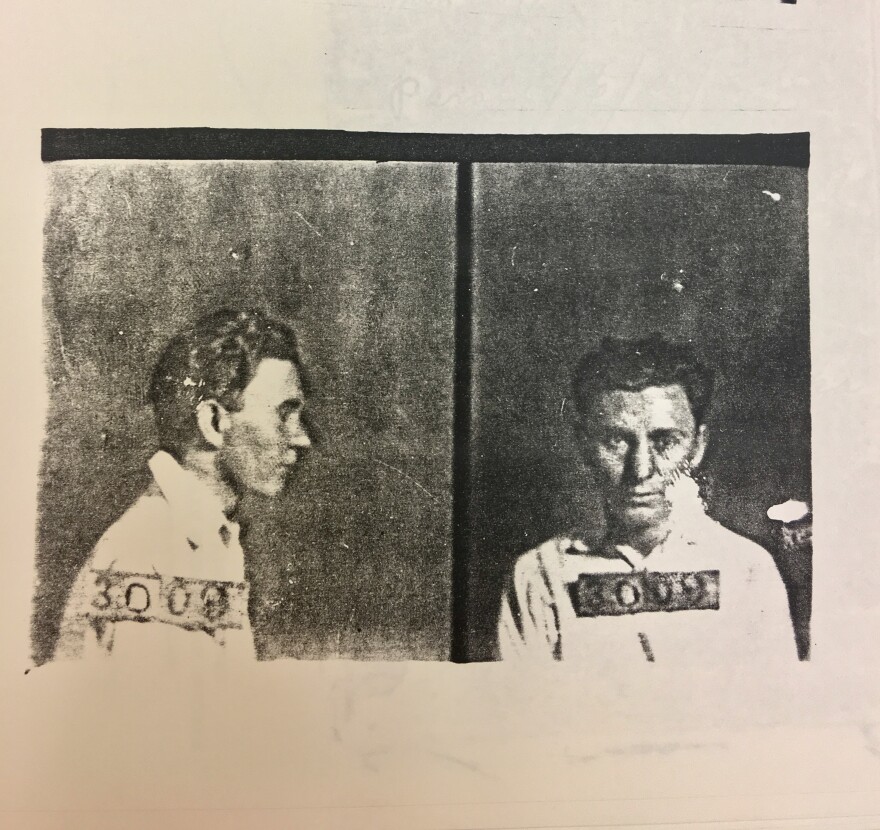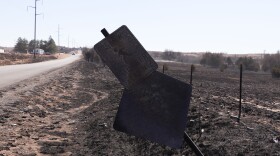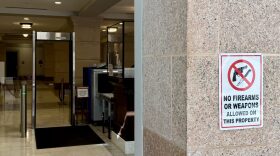Aviator Wiley Post gained global fame in the 1930s. He was known for smashing around-the-world flight records, but did he also spend time in an Oklahoma prison for a felony?
KGOU listener Colin McEwen first heard rumors of Post’s criminal past in 2006, when the Oklahoma State Supreme Court and the Court of Criminal Appeals were preparing to move into the newly renovated Wiley Post Historical Building in Downtown Oklahoma City.
“It’s just a little too quintessentially Oklahoma for us to have our state judicial center named after a convicted felon,” said McEwen.
McEwen asked How Curious: Was Wiley Post truly a convicted felon?
Around The World In Eight Days
WileyPost flew his small Lockheed Vega airplane, the “Winnie Mae,” around the world solo in seven days, 18 hours and 49 minutes in 1933, breaking his own record. Two years earlier, he and navigator Harold Gatty had landed in New York City to a ticker tape parade after circumnavigating the globe in just eight days.
“When we think about notable figures of the time we think about maybe Charles Lindbergh and Amelia Earhart,” said Roger Connor, curator at the National Air and Space Museum. “But if you were a young person in the early 1930s, you might know Wiley Post just about as well as those others.”

Post was born to a family of cotton farmers in 1898. He spent the early part of his childhood moving between towns in Oklahoma and Texas. By 1920, Post’s parents settled on a farm near Maysville, Oklahoma.
“Many times [Post] disappeared from home and seemed lost for hours, only to be found later at some neighbor’s house, studying a newly arrived sewing machine, or out in some field, disassembling and then reassembling a farmer’s recently purchased seeder,” wrote Bryan B. Sterling and Frances N. Sterling in Forgotten Eagle: Wiley Post, America’s Heroic Aviation Pioneer.
Post left home at age 11 to work as a traveling repairman. By age 13 he had supposedly saved enough money to buy the first bicycle in the county.
He saw his first airplane, a Curtiss Pusher, at the state fair in Lawton in 1913.
“I have never seen a bit of machinery for land, sea, or sky that has taken my breath away as did that old pusher,” read Post’s ghostwritten autobiography, Around the World in Eight Days.
Bandit Captured
In 1921, after several years of working jobs in construction, the military and the oil industry, Post was captured by four men he attempted to rob in Grady County. He reportedly placed an automobile casing in the middle of the road, hid nearby, and then pointed a gun at the men when they stopped their car to pick up what they thought was a lost object.
The front page of the Chickasha Star published a story April 2 with the headline: “Bandit Captured and Lodged in Jail.”
No one really knows why Post turned to robbery, but he pled guilty and was sentenced to 10 years in the state reformatory in Granite, Oklahoma. He was prisoner number 3009.
Post became withdrawn in prison, avoiding social contact with other prisoners and rarely speaking to others, according to Bryan and Frances Sterling.
“There was no doubt; Post was racing toward a state of total psychological failure,” they wrote.
Two prison doctors recommended Post be paroled due to his declining mental health and in 1922, about one year into Post’s sentence, Governor J.B.A. Robertson granted his release.

"A Self-Made Man"
Following his incarceration, Post returned to the oil fields, where he supplemented his income by parachuting from airplanes in a flying circus. He lost his left eye in a rig accident in 1926 and used the injury settlement money to buy his first plane.
Oilman Florence Hall hired Post as a pilot, and he went on to set flying records in the Winnie Mae, named after Hall’s daughter. Post won a race between Chicago and Los Angeles in 1930 and completed his two around-the-world flights in 1931 and 1933, becoming a household name.

“He was a self-made man, hard scrabble, persistent, tough--all those qualities that fed what an ideal hero at that dark moment of the Depression was,” said Connor.
Post’s experimental flights proved the importance of the jet stream and the pressure suit he wore for high-altitude flights was a precursor to those worn by astronauts in the 1950s and 60s.
Post died in a plane crash near Point Barrow Alaska in 1935 alongside humorist and popular culture icon Will Rogers.
“The nation entered a state of mourning that it has rarely done outside of the death of presidents,” wrote Connor.
Post’s and Rogers’ names now grace Oklahoma City airports and the Oklahoma Judicial Center is located in a building named after Post, a convicted felon.
Listener Colin McEwen thinks that’s ironic but one historian disagrees.
“It’s very appropriate,” said Bob Blackburn, Oklahoma History Center Director.
“It shows that [the criminal justice system] is about correcting behavior, not just punishing. Wiley Post is a great example of that. [They] gave him a second chance, he [was] paroled and did great things with his life and changed history.”
How Curious is a production of KGOU Radio. It’s produced by Claire Donnelly and this episode was edited by Caroline Halter. David Graey composed the theme music.
Email your questions about Oklahoma to curious@kgou.org. Subscribe to the How Curious podcast on iTunes or your favorite podcast app.
As a community-supported news organization, KGOU relies on contributions from readers and listeners to fulfill its mission of public service to Oklahoma and beyond. Donate online, or by contacting our Membership department.








